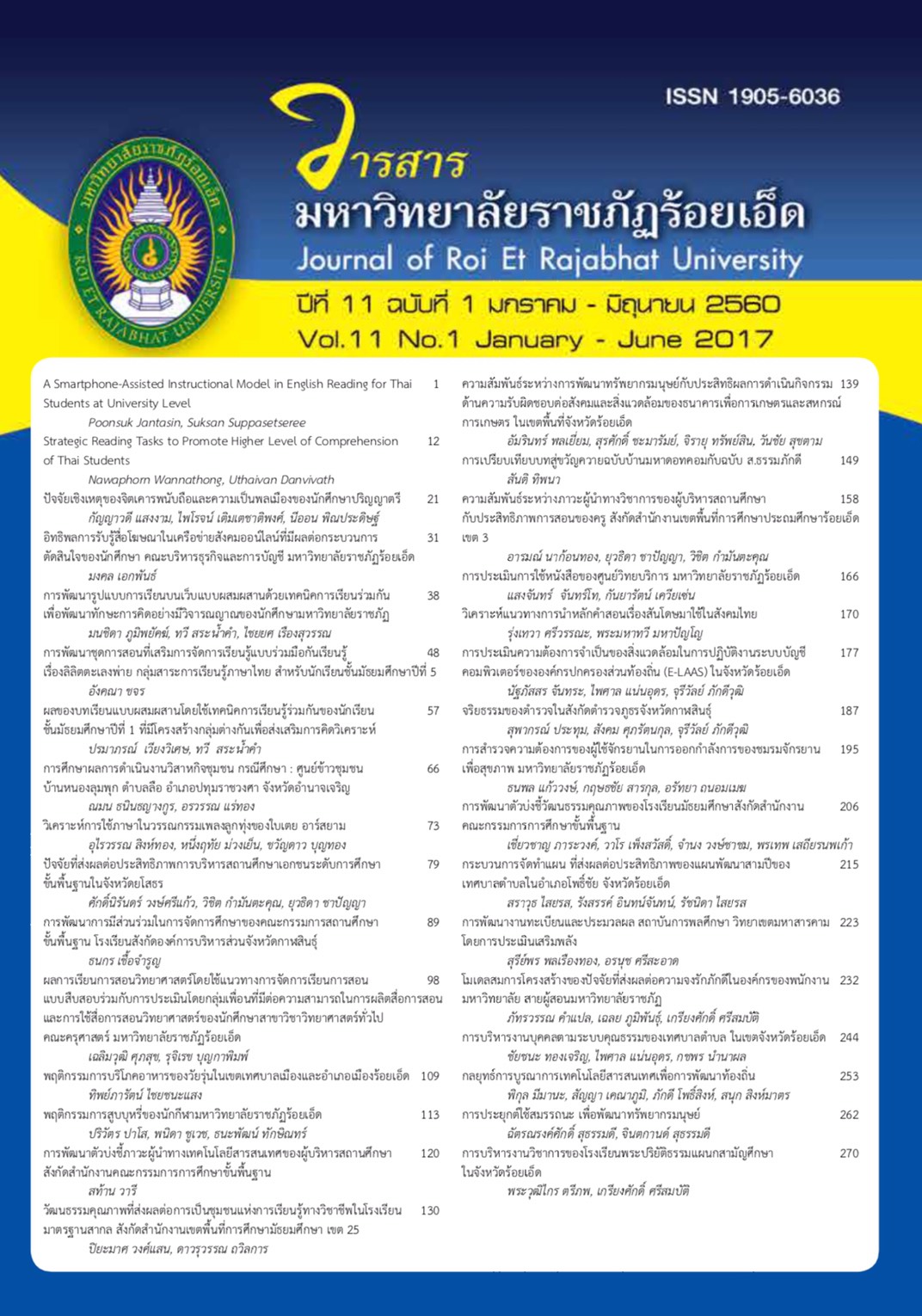Quality Culture Affecting Professional Learning Communities in World-Class Standard Schools under the Secondary Educational Service Area Office 25
Keywords:
Quality Culture, Professional Learning Community, World-Class Standard SchoolAbstract
This research aimed to investigate 1) the level of quality culture in world-class standard schools under the Jurisdiction of the Secondary Educational Service Area Office 25, 2) existing level of being an professional learning community among worldclass standard schools, 3) the quality culture and its relationship with the professional learning community in world-class standard schools, 4) quality cultures and their influences on the development of the occupational learning community in world-class standard schools. The participants were 329 teachers and administrators from world-class standard schools. Questionnaires were used for data collection. The data was analyzed via mean, percentage, standard
deviation, the Pearson Product Coefficient, and the stepwise multiple regression. The following results were observed. 1) The level of the quality culture in world-class standard schools was at a “high” level. The itemized study of the quality culture showed that most items were also at a “high” level. The first two factors rated with the highest scores were valuing the service recipients, and leadership qualities. The item with the lowest score was team work. 2) The existing level of being a professional learning community among the schools was at a “high” level. The first two factors with the highest scores were values and visions of organization and professional learning and development. The item rated with the lowest score was collaboration. 3) The relationship between the quality culture and the level of being an professional learning community in world-class standard schools was rated at a “high” level in all items. All pairs of relationship possessed positive relationships with a statistical significance at the level of 0.01. 4) It was observed that there were three quality cultures of the world-class standard schools that enhanced the development of the professional learning community including; 1) valuing the service recipients, 2) empowerment and 3) team work. The multiple correlation equal to 0.828, a predictive coefficient or the predictive power of 68.5 percent, with statistical significant level at 0.01. Accordingly, the prediction equation can be presented via forms of unstandardized and standardized scores as follows: Prediction equation with unstandardized score = 0.785 + 0.399(
) + 0.223(
) + 0.180(
) Prediction equation with standardized score
= 0.433(
) + 0.261(
) + 0.221(
) 8
References
กันยายน 2558 จาก http://www.onesqa.or.th/th/contentdownload-view/929/1155/
ชุลีพร เกลี้ยงสง. (2558). กลยุทธ์การพัฒนาวัฒนธรรมองค์การ เพื่อส่งเสริมการเป็นชุมชนแห่งการเรียนรู้ในสถานศึกษา
ขั้นพื้นฐาน สังกัดกรมส่งเสริมการปกครองส่วนท้องถิ่น. วารสารวิชาการมหาวิทยาลัยอีสเทิร์นเอเชีย ฉบับ
สังคมศาสตร์และมนุษยศาสตร์ ปีที่ 5 ฉบับที่ 1 ประจำเดือนมกราคม-เมษายน 2558. ปทุมธานี : มหาวิทยาลัย
อีสเทิร์นเอเชีย
ธัญพร บุญรักษา. (2553). ปัจจัยที่ส่งผลต่อการเป็นชุมชนแห่งการเรียนรู้ของโรงเรียนในสังกัดองค์กรปกครองส่วน
ท้องถิ่นในจังหวัดเลย. วิทยานิพนธ์ ค.ม. (การบริหารการศึกษา). เลย : มหาวิทยาลัยราชภัฎเลย.
ภาวนา กิตติวิมลชัย และกนกอร สมปราชญ์. (2556). วัฒนธรรมคุณภาพในสถานศึกษา : ในเครือข่ายอุดมศึกษาใน
ภาคตะวันออกฉียงเหนือตอนบน . ค้นจาก https://qm.kku.ac.th/files/14-255788134815-phanch-1.pdf.
มารยาท แซ่อึ้ง และเอกชัย กี่สุขพันธ์. (2552). การศึกษาการบริหารงานวัฒนธรรมคุณภาพของสถานศึกษาระดับ
มัธยมศึกษาสังกัดสานักงานคณะกรรมการการศึกษาขั้นพื้นฐาน เขตกรุงเทพมหานครและปริมณฑล:
วารสารอิเล็กทรอนิกส์ทางการศึกษา Vol.5, 2 พฤศจิกายน 2552 : 986-1000
ณัฐิกา นครสูงเนิน. (2556). ความสัมพันธ์ระหว่างภาวะผู้นาทางวิชาการของผู้บริหารกับการเป็นชุมชนแห่งการเรียนรู้
ของโรงเรียนสังกัดสำนักงานเขตพื้นที่การศึกษาประถมศึกษาเลย เขต1. ค้นเมื่อวันที่ 19 ตุลาคม 2558
ค้นจากเว็บ http://www.kmutt.ac.th/jif/public_html/article_detail.php?ArticleID=168919
มินตรา ลายสนิทเสรีกุล. (2557). วารสารอิเล็กทรอนิกส์ทางการศึกษา จุฬาลงกรณ์มหาวิทยาลัย เรื่อง กลยุทธ์การบริหาร
โรงเรียนสู่การเป็นชุมชนแห่งการเรียนรู้วิชาชีพของโรงเรียนมัธยมศึกษาในสหวิทยาเขตเบญจบูรพา
กรุงเทพมหานคร. ค้นเมื่อวันที่ 18 ตุลาคม 2558 จาก
http://www.edu.chula.ac.th/ojed/doc/V93/v93d0032.pdf
วิจารณ์ พานิช. (2555). วิถีสร้างการเรียนรู้เพื่อศิษย์ในศตวรรษที่ 21. กรุงเทพฯ : มูลนิธิสดศรี – สฤษดิ์วงศ์.
วรลักษณ์ ชูกำเนิด. (2557). โรงเรียนแห่งการเรียนรู้ทางวิชาชีพครู เพื่อการพัฒนาวิชาชีพครูที่เน้นผู้เรียนเป็นหัวใจสำคัญ.
วารสารวิทยบริการ มหาวิทยาลัยสงขลานครินทร์ ปีที่ 25 ฉบับที่ 1 มกราคม – เมษายน 2557. หน้า 93 – 102.
สถาบันวิจัยพฤติกรรมศาสตร์ มศว. (2558). การสร้างชุมชนแห่งการเรียนรู้ทางวิชาชีพ. ค้นเมื่อวันที่ 22 ธันวาคม 2558
จาก https://candmbsri.wordpress.com/category/plc/ .
สำนักงานคณะกรรมการการศึกษาขั้นพื้นฐาน. (2553). คู่มือการประเมินสมรรถนะครู (ฉบับปรับปรุง) สำนักงาน
คณะกรรมการการศึกษาขั้นพื้นฐาน. กระทรวงศึกษาธิการ.
Batten, Joe D. (1992). Building a Total Quality Culture. Menlo Park, CA: Crisp Publication.
DuFour, R., Eakey, R., & Many, T. (2006). Learning by Doing A Handbook for Professional Learning
Communities at Work. Bloomington, IN: Solution Tree Press.
Downloads
Published
How to Cite
Issue
Section
License
บทความที่ได้รับการตีพิมพ์เป็นลิขสิทธิ์ของวารสารมหาวิทยาลัยราชภัฎร้อยเอ็ด
ข้อความที่ปรากฏในบทความแต่ละเรื่องในวารสารวิชาการเล่มนี้เป็นความคิดเห็นส่วนตัวของผู้เขียนแต่ละท่านไม่เกี่ยวข้องกับมหาวิทยาลัยราชภัฎร้อยเอ็ด และคณาจารย์ท่านอื่นๆในมหาวิทยาลัยฯ แต่อย่างใด ความรับผิดชอบองค์ประกอบทั้งหมดของบทความแต่ละเรื่องเป็นของผู้เขียนแต่ละท่าน หากมีความผิดพลาดใดๆ ผู้เขียนแต่ละท่านจะรับผิดชอบบทความของตนเองแต่ผู้เดียว





